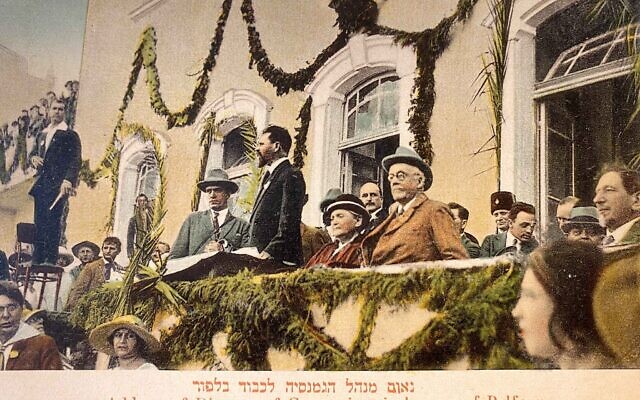The British impact on the creation of Israel
So much and so many went into building the State of Israel
Anglo-Palestine Company
Ahuzat Bayit (‘homestead’) was a group seeking to form an urban community outside of Jaffa in 1906, which approached the Jewish National Fund for a loan to purchase land. The JNF was supportive but for one problem: local laws prevented it. The Anglo-Palestine Company, formed four years earlier to fund settlement and development initiatives, determined the loan was too risky, but came up with a plan: the JNF loaned 300,000 French francs to Anglo-Palestine, which issued a series of 300 bonds against the loan, at 1000 francs each. Anglo-Palestine loaned the funds back to the founders of Ahuzat Bayit, which became the original name of Tel Aviv. The proceeds allowed 60 residents to build homes, while the Anglo-Palestine Company became Israel’s largest bank: Bank Leumi.
The Balfour Declaration
The Balfour Declaration of 2 November 1917 was the British government’s statement of public support for a Jewish homeland in Palestine. It was a hand-delivered letter from foreign secretary Lord Arthur Balfour to Lord Walter Rothschild, president of the English Zionist Federation. Rothschild said the Declaration was the most momentous historical Jewish occasion in 1,800 years: for the first time since the Roman dispersion from Palestine in 70AD, aspirations for a national home were recognised. The declaration was celebrated across the world – children were named Balfoura, and a cottage area north of Toronto was named after it: Balfour Beach.
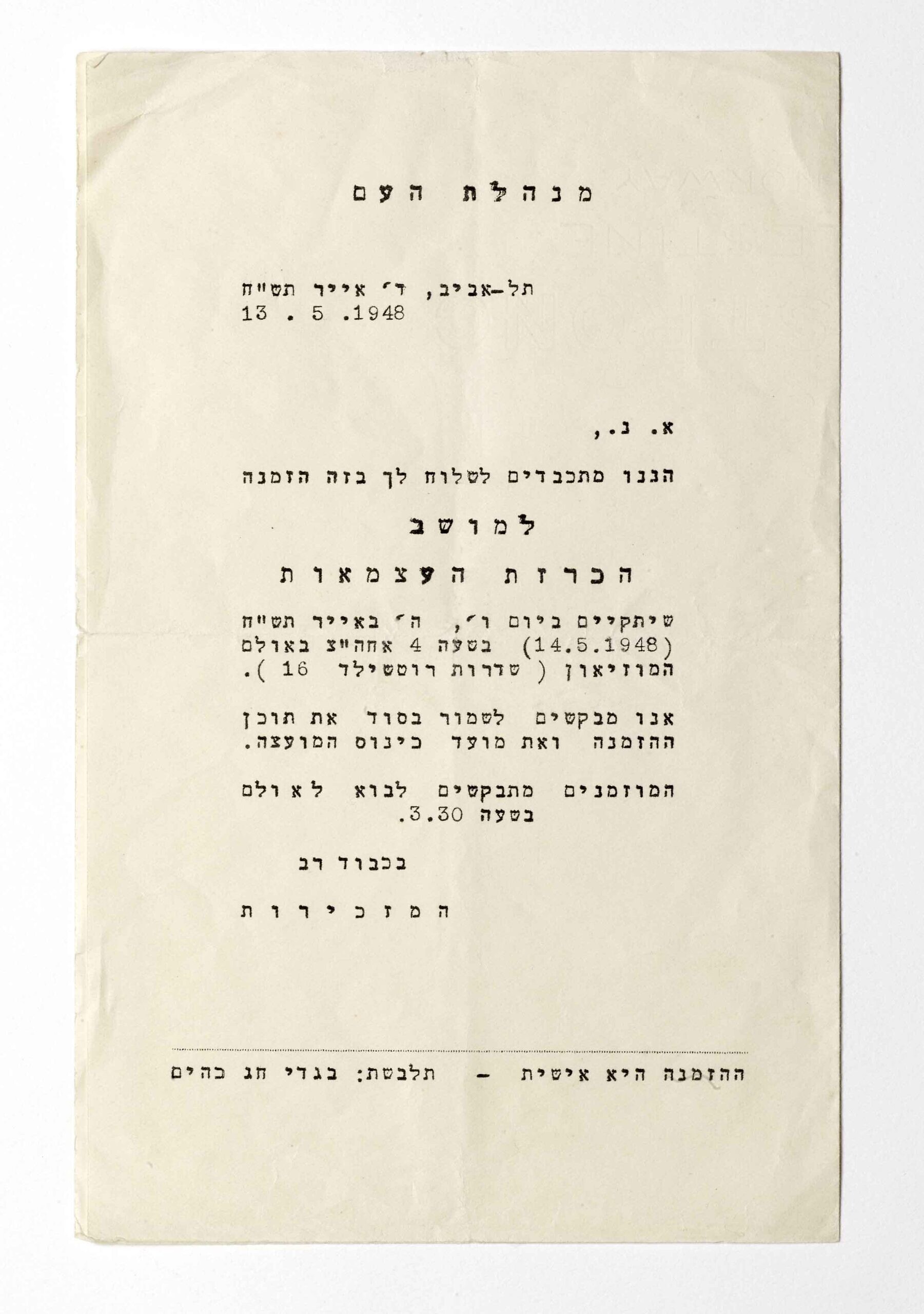
Palestine Foundation Fund
Keren Hayesod (Palestine Foundation Fund) was established in 1920 in London, to finance the Zionist movement’s work to bring about the return of the Jewish people to the Land of Israel. Leading figures from Chaim Weizmann to Ze’ev Jabotinsky were involved in its fundraising efforts. Keren Hayesod helped raise the seed money to establish the Hebrew University and the Israel Philharmonic Orchestra. It also helped develop the Haifa Bay suburbs to settle German Jewish refugees in the 1930s, and established dozens of communities to house the waves of immigrants after Israel’s creation. It continues to serve as a link between the people of Israel and Jewish communities around the world.
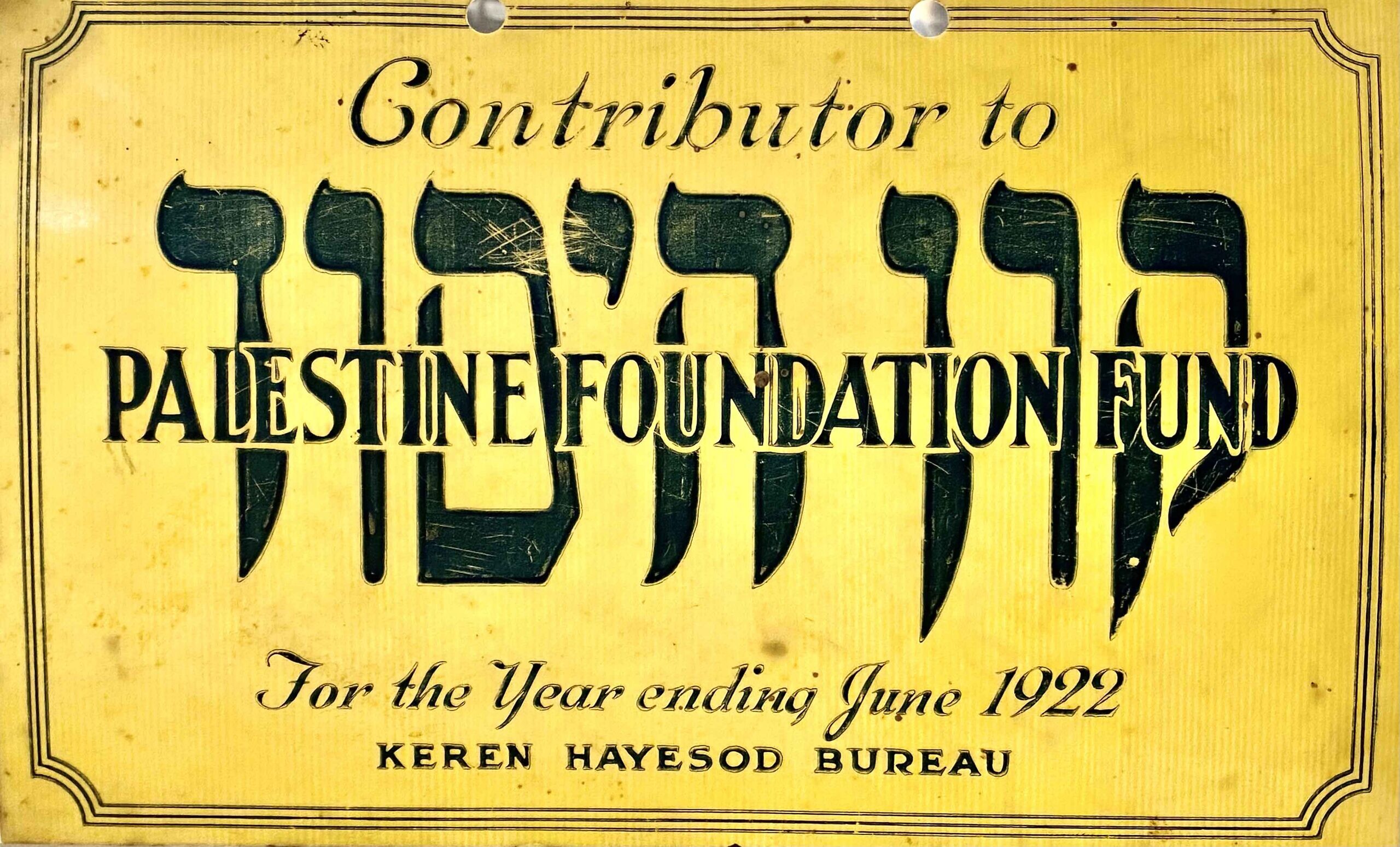
Sir Edmund Allenby
General Sir Edmund Allenby (1861-1936) commanded the British Army’s Egyptian Expeditionary Force in the First World War. He led the conquest of southern Palestine including Gaza and Beersheva before capturing Jerusalem in December 1917, which ended nearly 500 years of Ottoman or Turkish rule. When he arrived in Jerusalem, Allenby rode his horse to the Jaffa Gate, then dismounted to enter the Old City on foot out of respect for the holiness of the site – in contrast to Germany’s Kaiser Wilhelm, who in 1898 rode into the city on a white horse. Allenby worked with Jerusalem’s community leaders to ensure that the religious sites of all faiths were protected. Allenby Junior Public School in Toronto’s Lawrence Park neighbourhood, which opened in 1931, is named in his honour.
End of British Mandate
The United Nations voted on 29 November 1947 to partition Palestine to create separate Jewish and Arab states. The British decided to end their mandate on Saturday 15 May 1948, but the State of Israel was declared before sundown the night before, by David Ben-Gurion. The invitation to the Declaration of Independence ceremony – the most momentous Jewish event in 2,000 years – was a plain piece of folded printed paper delivered by bicycle courier. Guests were invited to the Tel Aviv Museum, but asked to keep it a secret. Great excitement was combined with fear, as all in attendance knew a long, hard fight to protect the Jewish state would follow.
Lord Arthur Balfour
The Balfour Declaration was the 2 November 1917 statement of the British Government that it views “with favour the establishment in Palestine of a national home for the Jewish people.” Lord Arthur Balfour, the author of those words, toured Palestine in 1925 at the invitation of Zionist leader Chaim Weizmann. He attended the ceremonial opening of the Hebrew University in Jerusalem, and was welcomed throughout his tour with great honour and ceremony by the Jewish population. But the Arab population greeted Balfour with strikes and protests; after Palestine, he travelled to Damascus where he was greeted by a hostile crowd of 6,000. A riot ensued. Fearing for his safety, Balfour ended his trip to Syria early, and returned home.
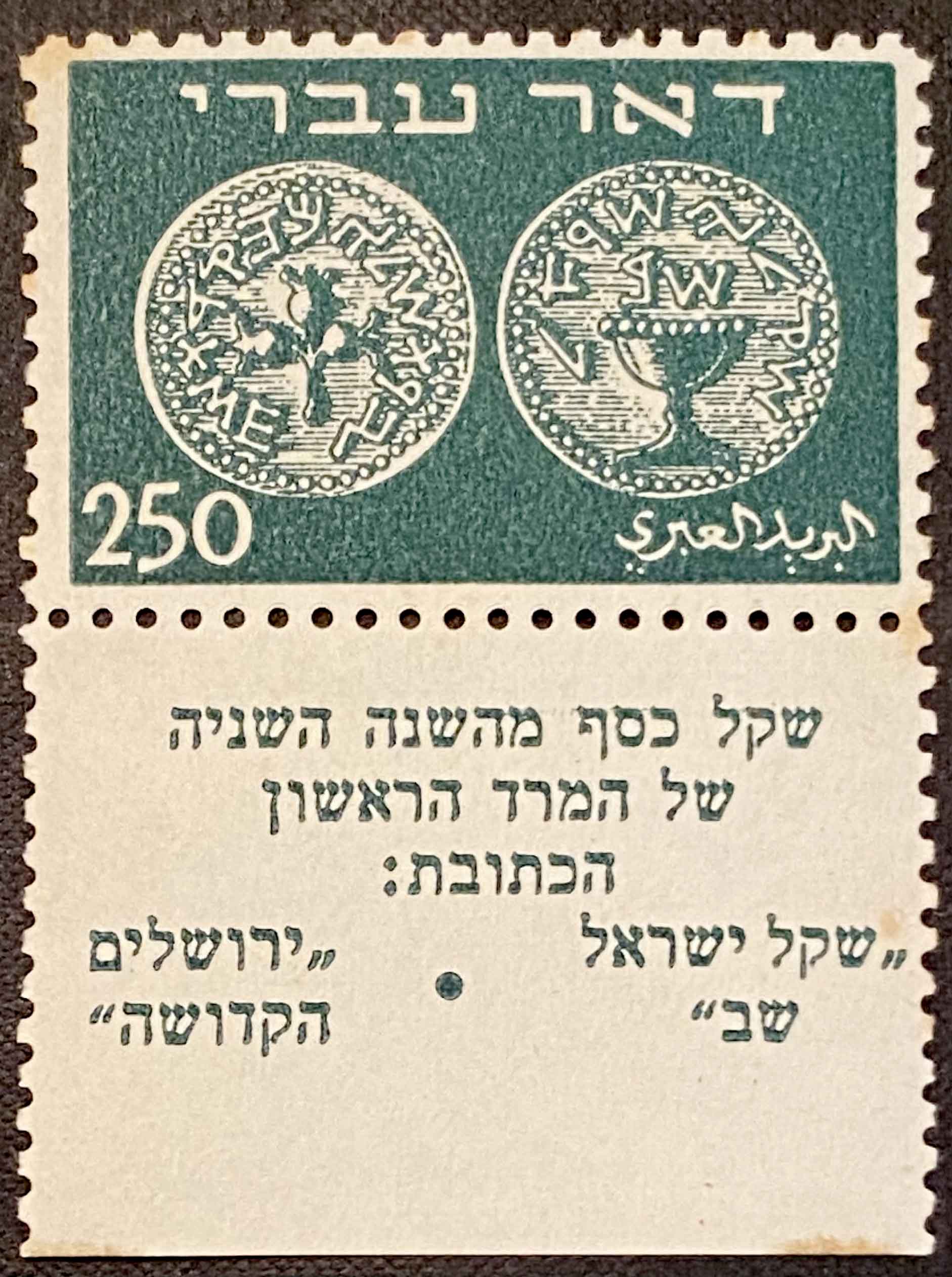
Secret stamps
Israel’s first postage stamps said Doar Ivri (Hebrew post) because they were printed before the country’s name was known. Never before had a state prepared its first stamps without knowing the name it would eventually adopt. Prepared in secret because doing so was illegal while the British were still in the country, they feature ancient Hebrew coins to emphasise the connection of the Jewish people to its ancestral homeland. Tabs were added on the bottom row of each sheet to translate the coin’s inscription. Israel was declared on Friday May 14 and on Sunday post offices sold these stamps. It was the first tangible sign that the Jewish state had been born.
King David Hotel
The King David Hotel opened in Jerusalem in 1931 with construction financing provided by wealthy Egyptian Jews and the National Bank of Egypt. Since then, it has hosted emperors, kings and many world leaders, including seven US presidents. During the British Mandate, the south wing of the hotel served as the British administrative and military headquarters. In a controversial operation, on 22 July 1946 the Irgun military group bombed the hotel, resulting in 91 deaths. Multiple scenes of the movie Exodus were filmed here, including Ari Ben Canaan (Paul Newman) lunching on the terrace overlooking the Old City.
Jewish Army Brigade
The Jewish Brigade of the British Army was the source of a 1945 Rosh Hashanah card from a Palestinian soldier wishing for a year of redemption and restoration of the Jewish state. During the Second World War, about 30,000 Jewish volunteers from Palestine served with the British forces: 700 were killed. Flying the Zionist flag, the brigade fought in Italy from March 1945 until the German surrender in May. The soldiers also helped organise displaced persons camps for Holocaust survivors and assisted the illegal immigration of Jewish refugees to Palestine. Brigade veterans served with distinction in the Israel Defence Forces and 35 rose to the ranks of general.
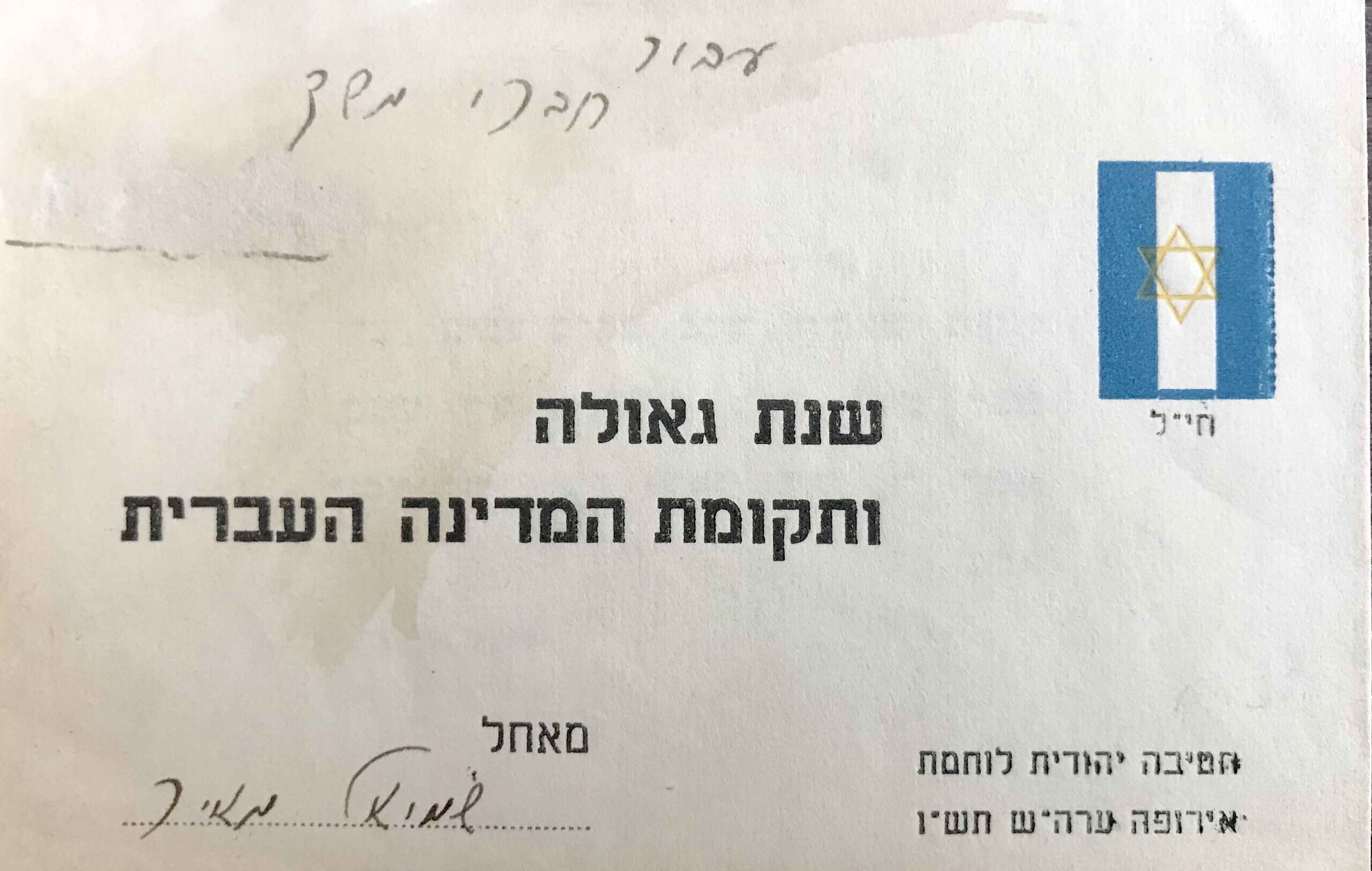
Dov Guner
Dov Gruner was a member of the Irgun, the pre-state Jewish paramilitary group that operated in Palestine during the British Mandate. Gruner joined the Irgun after serving in the British army fighting the Nazis. He was wounded in a raid against a police station, captured and charged. His trial before a British military court began on 1 January 1947. Gruner refused to recognise the authority of the court because the British betrayed their commitment to help establish the Jewish homeland, saying “there is no power in the world which can sever the tie between the Jewish people and their one and only land.” Refusing to offer a defence or accept any commutation, on 16 April 1947 Gruner was hanged in Acre prison together with three colleagues. He was 35.
British end postal services
The Partition Resolution passed by the United Nations on 29 November 1947 called for the creation of a Jewish State and the end of the British Mandate. The British then started to wind down their administrative duties including ending postal services in April 1948. But, to ensure the public would still be able to send and receive mail, the provisional Jewish government in Palestine improvised and authorised the use of pre-existing Jewish National Fund stamps (overprinted with the word ‘Doar’ or post) as valid postage stamps. Among these JNF stamps were one depicting the partition map of the independent Jewish state and the other the Negev water pipeline. Israel issued its own stamps right after independence.
David Matlow of Toronto, Canada, owns a large collection of Zionist and Theodor Herzl memorabilia (over 6,000 items). In his weekly Treasure Trove column in the Canadian Jewish News (www.thecjn.ca) David shares one item from his collection which, when they are all pieced together tell the story of the dream for a Jewish homeland, and the realisation of that dream. More information about David’s collection is available at www.herzlcollection.com

Thank you for helping to make Jewish News the leading source of news and opinion for the UK Jewish community. Today we're asking for your invaluable help to continue putting our community first in everything we do.
For as little as £5 a month you can help sustain the vital work we do in celebrating and standing up for Jewish life in Britain.
Jewish News holds our community together and keeps us connected. Like a synagogue, it’s where people turn to feel part of something bigger. It also proudly shows the rest of Britain the vibrancy and rich culture of modern Jewish life.
You can make a quick and easy one-off or monthly contribution of £5, £10, £20 or any other sum you’re comfortable with.
100% of your donation will help us continue celebrating our community, in all its dynamic diversity...
Engaging
Being a community platform means so much more than producing a newspaper and website. One of our proudest roles is media partnering with our invaluable charities to amplify the outstanding work they do to help us all.
Celebrating
There’s no shortage of oys in the world but Jewish News takes every opportunity to celebrate the joys too, through projects like Night of Heroes, 40 Under 40 and other compelling countdowns that make the community kvell with pride.
Pioneering
In the first collaboration between media outlets from different faiths, Jewish News worked with British Muslim TV and Church Times to produce a list of young activists leading the way on interfaith understanding.
Campaigning
Royal Mail issued a stamp honouring Holocaust hero Sir Nicholas Winton after a Jewish News campaign attracted more than 100,000 backers. Jewish Newsalso produces special editions of the paper highlighting pressing issues including mental health and Holocaust remembrance.
Easy access
In an age when news is readily accessible, Jewish News provides high-quality content free online and offline, removing any financial barriers to connecting people.
Voice of our community to wider society
The Jewish News team regularly appears on TV, radio and on the pages of the national press to comment on stories about the Jewish community. Easy access to the paper on the streets of London also means Jewish News provides an invaluable window into the community for the country at large.
We hope you agree all this is worth preserving.


